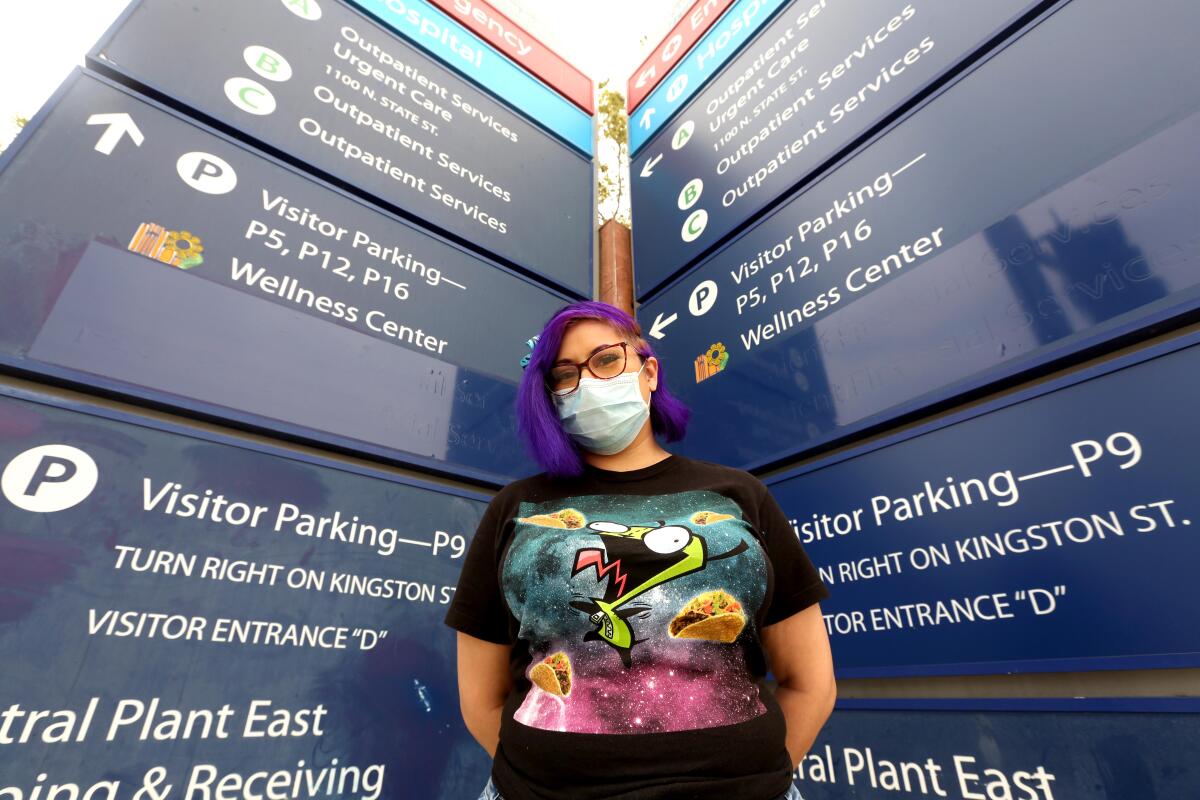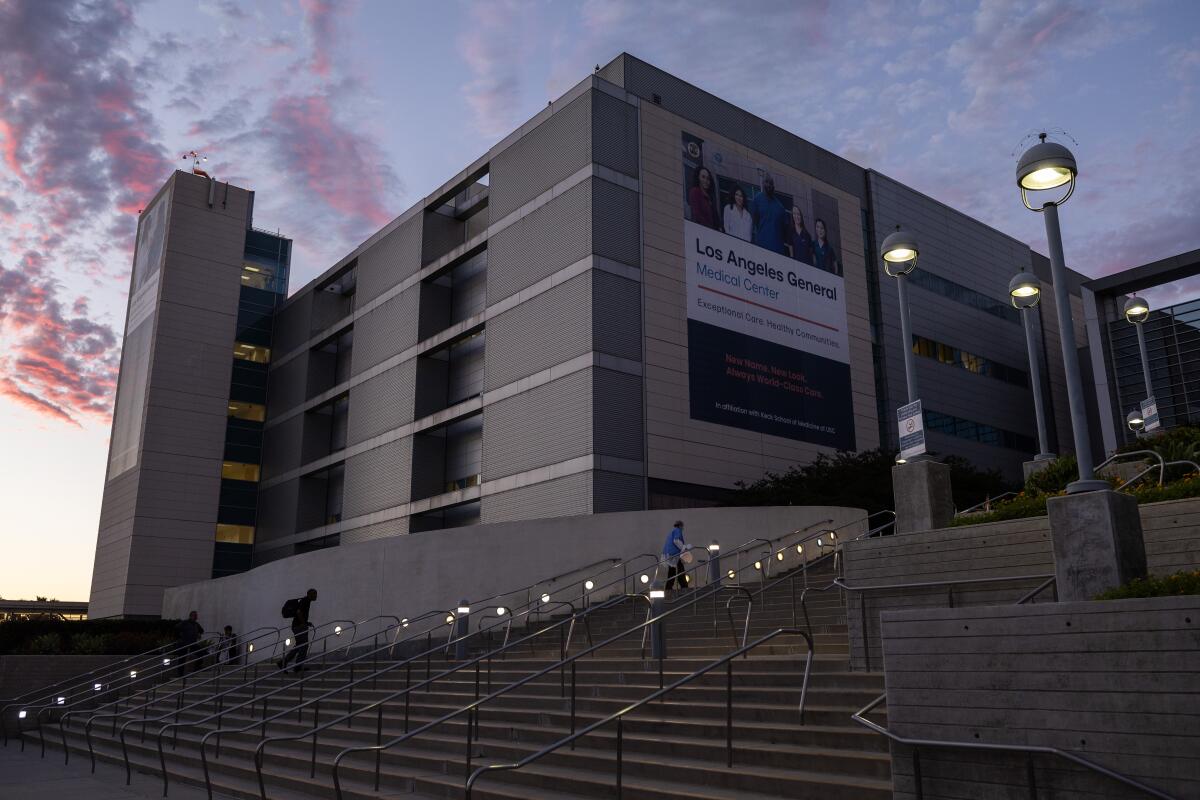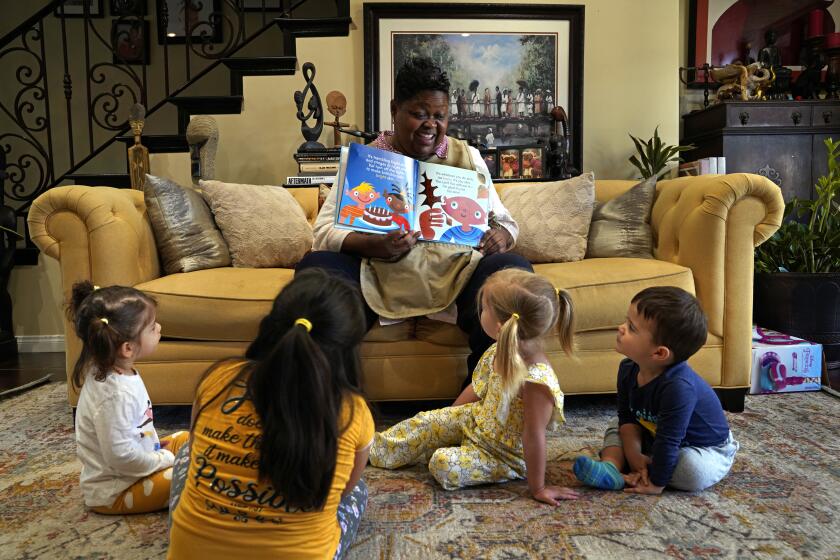L.A. General is closing a mental health clinic. Longtime patients worry about the move

- Share via
When Theresa Talavera was beset with thoughts of suicide, she turned to a familiar place in Boyle Heights.
“They took care of me right there and then,” the Highland Park resident said. “And I never left.”
Seventeen years later, the 73-year-old has kept going to the outpatient mental health clinic at Los Angeles General Medical Center, a public hospital run by the county.
Therapy and groups there have helped her manage her ups and downs. She has known some of her fellow patients for years, she said, as they grappled together with depression.
“Now that they’re closing, I’m going through a lot,” she said. “I’m in a roller coaster.”
Longtime patients like Talavera have worried about moving to other sites as the Los Angeles County Department of Health Services prepares to close the outpatient psychiatric clinic July 1.
A list of crisis hotlines, low-fee and sliding scale counseling, support groups, and mindfulness and meditation services
The county Department of Mental Health estimated the move would affect about 1,000 adult patients and up to 160 children and adolescents. Adults may switch to a Department of Mental Health facility less than two miles away in Lincoln Heights or its other clinics, including sites that may be more convenient for them, county officials said.
The department’s chief medical officer, Dr. Curley Bonds, acknowledged the move could be more complicated for children, whose options for psychiatric care are often more limited. Still, Bonds estimated last week that over half of the children at the L.A. General clinic had already gotten appointments to continue getting care elsewhere.
Suicide prevention and crisis counseling resources
If you or someone you know is struggling with suicidal thoughts, seek help from a professional and call 9-8-8. The United States’ first nationwide three-digit mental health crisis hotline 988 will connect callers with trained mental health counselors. Text “HOME” to 741741 in the U.S. and Canada to reach the Crisis Text Line.
County officials said the Boyle Heights clinic has long been an outlier in mental health care offered by Los Angeles County: Psychiatric services of this kind are not typically provided at county-run hospitals, but instead at facilities run by the the Department of Mental Health and its network of providers, they said.
In a joint statement, the mental health and health services departments said the move aims to “centralize outpatient specialty mental health services” under the Mental Health Department.
Doing so would give patients access to a broader range of specialized mental health professionals and resources; ensure “consistent and streamlined care” under one department; and make it easier for patients to access care through the Mental Health Department’s network of clinics around the county, among other benefits, they said.
“This transition is to plug in these clinics into the existing model of care,” L.A. General Chief Executive Jorge Orozco said at a Friday meeting at the hospital.
At the meeting, Bonds said the Mental Health Department was doing everything it could “to really step up to the plate to make sure that no one is left behind” during the transition. A care coordinator from the department will be embedded at L.A. General to assist with handoffs to other clinics, county officials said.
“With a transition of this magnitude, it’s inevitable that everything won’t go perfectly,” Bonds said. “But our commitment is to make sure that we address those concerns when they come up.”
Orozco said that “this is a decision that has been in discussion for at least five years.” But the plan is much newer to patients like Talavera, who have started to learn about the impending closure in recent weeks.
Griselda Avendaño, 65, worried aloud about joining another therapy group elsewhere.
After going to the L.A. General clinic for eight years, “I’m going to start all over again?” she asked.
“I don’t think so. I’ll just rather stay home.”
Newsom announced that the state will make $3.3 billion in funding available by July to begin building mental health treatment centers.
Kelly Muhonen, a foster parent whose children have received care at the outpatient clinic, said her family was facing a six-month wait for a psychiatrist specializing in children with developmental disabilities such as autism.
“If this has been in the works for such a lengthy period of time,” Muhonen asked via Zoom during the Friday meeting, “why are we being told about it a month prior to the transition?”
Bonds said he didn’t want to dismiss her concerns, but “there is a standard that 30 days is the minimum time of notification.” L.A. General’s psychiatry chief, Dr. Talene Keshishian, said staffers “have been trying to notify patients in real time in their appointments, via letters, via outreach, via phone calls. ... One size does not fit all.”
“If we haven’t made it to you,” Keshishian told the meeting attendees, “we will continue to reach out.”
Muhonen said in an interview that even as a trauma therapist herself, “I have had to turn the world upside down to find the care that I needed for my kids,” particularly in light of their developmental needs.
She drives from Arcadia to the L.A. General clinic because the care there has been “really extraordinary,” she said. Among the benefits of the Boyle Heights clinic, she said, is that the mental health providers had access to other medical records for her children — including primary care — for a fuller picture of their complex needs.
As the L.A. General outpatient clinic prepares to close, “they did refer us to clinics within the community,” said Benito Tambunga, 53, who said he has gone there for more than two decades.
But the advantage of the L.A. General clinic is that during a mental health episode, “you can go immediately to the hospital and they have your records available, your history,” Tambunga said. “It’s all in-house.”
Officials from two county departments said their goal was to share health records “to give clinicians from either department a complete view” of patients’ medical histories, needs and ongoing treatment, according to their joint statement. Keshishian said Friday that they aimed to provide a summary with key information including medical conditions and what medications patients are taking as they make the move to the Department of Mental Health.

Los Angeles County Supervisor Hilda Solis, whose district includes the hospital, said she was closely monitoring the transition. “It is imperative to avoid any significant disruptions in care,” she said, “and that the departments engage directly with any impacted residents to ensure quality care remains accessible.”
The L.A. General clinic has also been connected to a residency program with USC that gives medical school graduates experience in psychiatry. After the transition, medical residents working with adults will be placed at the facility in Lincoln Heights, while those working with youths will be placed elsewhere, the Mental Health Department said.
In their joint statement, the two departments said moving psychiatry residents to the Lincoln Heights site “gives them greater exposure to the public mental health system” and would help with recruitment efforts at the Mental Health Department. Besides the residency program, county officials said some personnel from the L.A. General clinic would transfer to Lincoln Heights, including two psychiatrists and a registered nurse.
Rosa Hidalgo said that she struggles with any kind of change — and that no longer going to the L.A. General clinic is a big one. The 32-year-old started getting help there roughly six years ago, after becoming mired in depression. As she anticipates the move, Hidalgo said, anxiety has disrupted her sleep and given her stomach problems.
“I fell in love with that clinic because I ended up feeling at home,” she said.
Hidalgo was somewhat reassured by the idea that she might see some familiar staff at the Lincoln Heights site. Still, she said, “I’m taking it pretty hard.”
More to Read
Sign up for Essential California
The most important California stories and recommendations in your inbox every morning.
You may occasionally receive promotional content from the Los Angeles Times.












